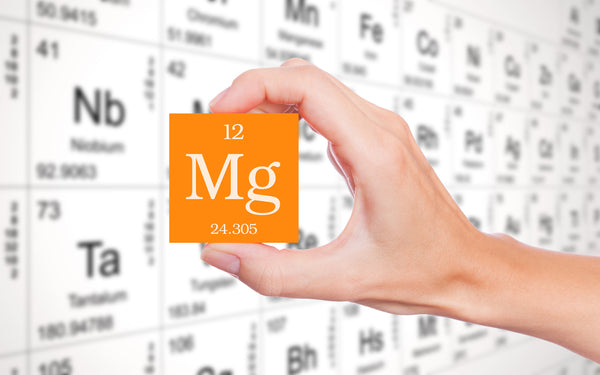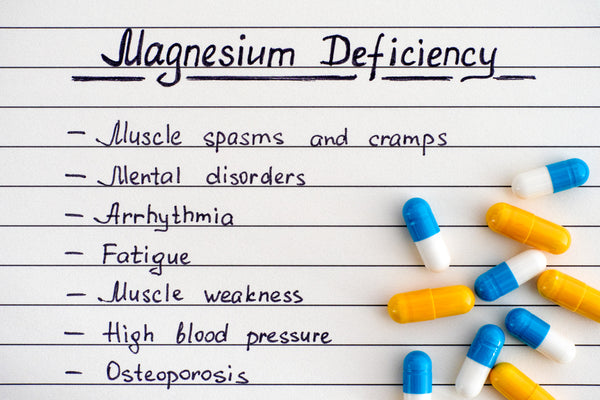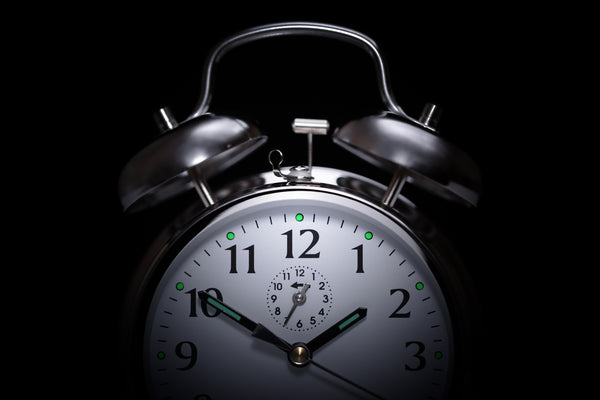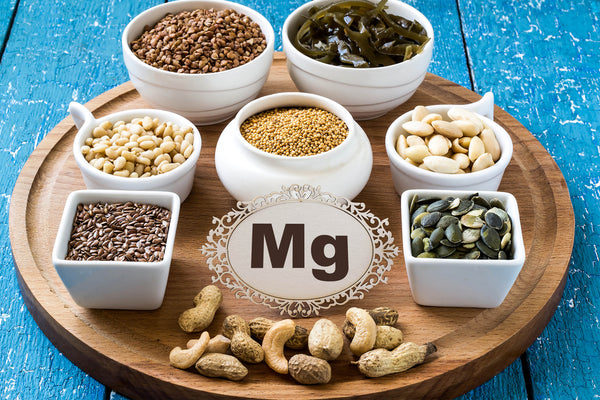Can Magnesium Really Help You Sleep Better? (YES)
So, you’re having trouble sleeping? We bet you’re looking for a complete guide to magnesium for sleep including which kind to take, when to take it, and how to start seeing benefits as fast as possible.
Lucky for you, that’s EXACTLY the type of guide we’ve got for you today! We can’t promise we’ll make you a morning person, but damn it, we’re going to try.

Magnesium and sleep... Can magnesium really help you fall asleep and wake up feeling refreshed? Yes, it can.
When lack of sleep is starting to kill your social and professional life, it’s time to take action. If taken correctly, magnesium supplements and life changes can have a big impact on sleep cycles.
At night, that means a deeper, more restful sleep. During the day it means more energy, a healthier mood, and better focus. The problem is that most people aren’t doing it right, or are even making their sleeping issues worse.
By the end of this guide, you’ll know the best kinds of magnesium to take (hint: THIS is the best magnesium to take, as it's a blend!), when to take them for max benefit, and what science has to say about Mg.
Magnesium for Sleep: A Quick Rundown
Just to make sure we’re on the same page, let’s take a quick glance on how magnesium affects your sleep (or lack thereof).
Magnesium is an essential mineral that your body MUST HAVE for most of its vital functions, including sleep, energy production, blood pressure regulation, muscle function, and stress response.
In terms of sleep, magnesium is important for activating GABA receptors, the primary receptors involved in relaxation, sleep, and anti-anxiety functions. Basically, when neurotransmitters bond to GABA receptors, it’s your brain’s way of saying “let’s just chill out”.
That’s what helps put you into a deep sleep…

The problem with magnesium supplementation is that you can overdo GABA activation. Too little and you’re going to be counting sheep all night. Too much and you’ll be down for the count, but never able to reach a deep, restorative sleep.
We’ll get to all of that right after this…
Does Magnesium Help You Sleep? - What Does Science Say?

Magnesium is gaining traction in biohacking communities because it has produced results in the lab. That’s a major sign that something is going on.
Personally, we always combine our own experiences with what science has proven. In this case, both are in agreement.
Healthy levels of magnesium help promote regular sleep and regulate your sleep cycles, meaning it could help you fall asleep faster, wake up feeling more refreshed, and ready to take on the day.
Here are some compelling studies that show the benefits of taking magnesium for sleep:
Who Needs a Magnesium Sleep Aid?
It’s hard to develop magnesium deficiency in the strict medical sense, because your kidneys regulate excretion to help you maintain healthy levels.
However, there are some groups who are at greater risk of developing magnesium inadequacy.
Who is at Risk for Magnesium Deficiency?
Groups at risk of magnesium deficiency include:
Sign of Magnesium Deficiency or Inadequacy

While you may not have an outright magnesium deficiency, low intake could be the cause of your sleep problems. Are you suffering from any of these symptoms?
IMPORTANT: Just because you have signs of these symptoms, DOES NOT mean you are deficient. It could be due to a HUGE range of factors and not necessarily your magnesium levels. Life is a holistic journey, complete with hundreds of interlocking systems and cycles. If you are dealing with chronic symptoms that are negatively affecting your life in a severe way, consult a doctor!
Which Magnesium Should You Take for Sleep?
The best magnesium to take for sleep is magnesium glycinate.
It is one of the most bioavailable forms of magnesium [5], but the secret sauce is the glycine content.
Glycinate is the best magnesium for sleep, because glycine plays a key role in the central nervous system. In clinical trials, just 3 g of supplementation resulted in improved sleep in patients with unsatisfactory sleep, with 0 side effects [6].
There are a TON of magnesium supplements out there, and each has a specific function. So do some research and get a supplement that fits your end goals.
Shameless Plug: Instead of taking magnesium for sleep or magnesium for relaxation, you can take one supplement complete with all of the proper ingredients to help regulate brain function and support healthy sleep/relaxation. Quad-Magnesium has helped countless of our customers improve sleep and it could do the same for you.
NOTE: Other forms of supplements that may helps with sleep are citrate and threonate.
Magnesium for Sleep: How to Take it Right
If you want to get maximum benefit from taking magnesium for sleep, you need to do it the RIGHT way.
There’s even an AWESOME trick we learned that really helped us get better, deeper sleep that we’ll share with you.
When to Take Magnesium for Sleep?

The best time to take magnesium for sleep is about 1 to 2 hours before bed, but preferably about an hour.
While everyone’s body is different, most clinical trials we’ve studied administered dosage about 1 hour prior to sleep. Personally, we experimented with taking it 1-3 hours prior to sleep.
We can’t say for sure if it was psychological or what, but we definitely fell asleep faster and felt more rested when taking it one hour before sleeping.
The VitaMonk Trick - CALCIUM AND MAGNESIUM: Calcium and magnesium are 2 of the most vital nutrients for sleep. Taking these 2 together, either via food or natural supplements could help make your sleep even better. For us, we try to have calcium with dinner (especially if it’s late), and then magnesium an hour before sleep.
Recommended Magnesium Dosage for Sleep
Based on the studies we’ve read, dosing can range anywhere from 100-500 mg. We recommend starting with a low dosage and seeing how it affects you.
Recommended intake of magnesium for men and women 19-30 is 400 mg and 310 mg respectively. And 420 mg and 320 mg for men and women 31 and older respectively.
Magnesium Before Bed - is it Safe?

Magnesium before bed has shown to have no major side effects unless you have specific health conditions. Some people have an Mg sensitivity that can cause vomiting or other not so nice to think about stomach issues (have a change of pants handy).
That's in very rare cases though. However, certain groups SHOULD NOT take it:
- Pregnant women
- People with immune disorders
- People with kidney issues
- People with cardiovascular disease
While taking magnesium night is well tolerated by healthy adults, you should always consult a physician if you have any doubts. Everyone’s body is different!
Magnesium is Best as a Supplement, NOT a Crutch
If you think you’re going to go from an insomniac to a morning person with just 500 mg of a magnesium supplement, it’s just not gonna happen. Unless you're massively deficient in magnesium levels it will only help promote better sleep.
Sleep is an infinitely complex bodily function. There are literally hundreds of contributing factors to how well you sleep, so it’s impossible to pinpoint any one thing and say “THAT’S WHAT’S KEEPING ME UP!”.
Magnesium, when taken right, can definitely help with better sleep in at least some way, but it YOU ABSOLUTELY HAVE TO combine it with lifestyle changes.
Think about it this way - what good is giving your body the nutrients it needs to sleep if it doesn’t have the physical capability of sleeping well?
If you’re drinking heavy doses of caffeine late in the day, eating poorly, consuming too much alcohol, or don’t have your head in a good place, no dose of supplementation is going to help much.
Here’s what to do:
Eat Magnesium Rich Foods

Our bodies process natural foods far better than supplements. There’s no better place to get magnesium than from real food. Of course, it’s not always possible to get as much as you need. Still, these magnesium rich foods are a good start:
Have at it!
Avoid Coffee in the Afternoon

Actually, coffee is another magnesium-rich food that can help up your intake easily. But you’ve got to be careful. Even one coffee in the afternoon can mess with your sleep, according to the NHS in the UK [7].
Caffeine even 6 hours before bedtime is going to make it tough to fall asleep and enter deeper sleep.
Exercise

This goes without saying, but the more you exercise the easier it is to fall asleep. The vast majority of studies in this meta-analysis found that exercise improved sleep [8].
Hit the gym!
VitaMonk Verdict: Magnesium for Sleep - Does it Work?

Based on scientific evidence and personal experience, YES magnesium works for sleep. You just need to do it right and understand that supplementation is not going to be a miracle cure.
For us, we take it as a way to enhance our sleep rather than a way to sleep. Does that make sense?
Magnesium promotes healthy sleep and regulates sleep functions, meaning if you are living a healthy life and taking steps to sleep better (diet, exercise, abstaining from sleep-killing behaviors), Mg can help make it even better.
References: